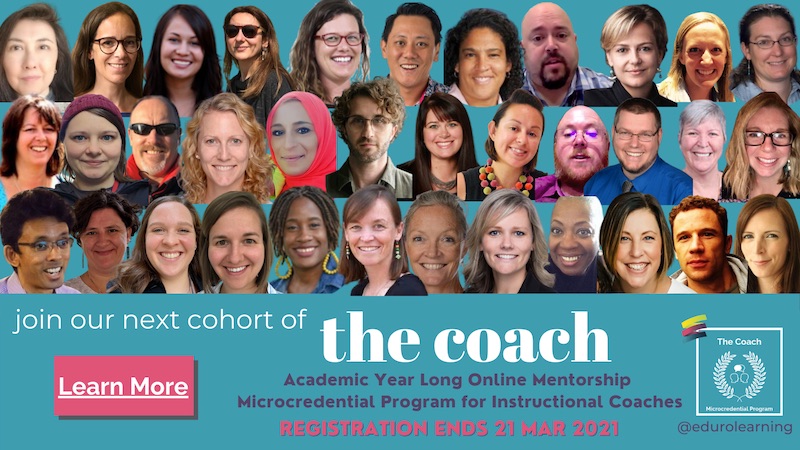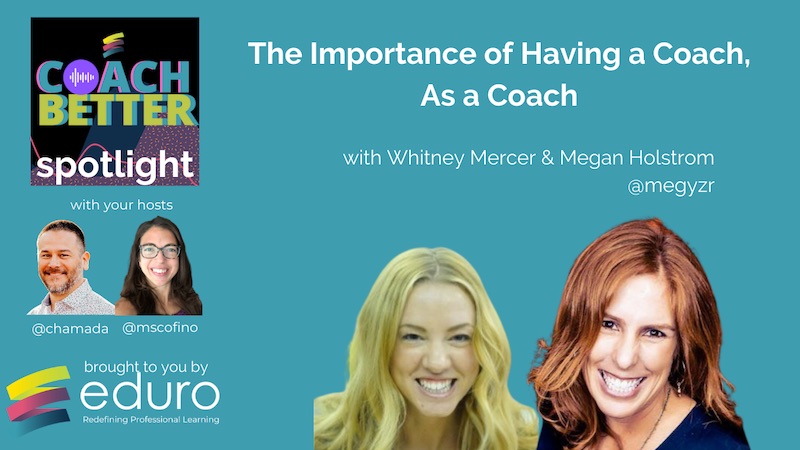In the fourth and final episode in our short series on Coaching in Practice, Kim is chatting with Whitney Mercer & Megan Holstrom. Whitney is the Lower School Instructional Coach at the American School of Madrid, and Megan is consulting as a coach with her school. From start to finish, this episode highlights the importance of having a coach, as a coach. The relationship that Megan and Whitney have built demonstrates the value of having someone to be vulnerable with, someone to work shoulder-to-shoulder with you, and someone to be a partner in learning. Not only will this episode convince you to work with a coach – as a coach, but there are tons of gems in here that are worth sharing with your teaching colleagues to help them understand the value of coaching!
Subscribe to #coachbetter via your favorite Podcast Player!
Bonus! Watch the Spotlight Version on YouTube!
Show Notes
Guest Information
Whitney: Lower School Instructional Coach: K1 – G5, Charter Schools & Public Schools in DC, NYC Public Schools
Megan: 3rd year consulting with American School of Madrid
Megan, as a coach/consultant, how did you approach and develop your relationship with Whitney? What did that feel like for you, Whitney? Please share your story of women supporting women in leadership and how you started working together
Megan: Year 1: Small group of people who support others, coordinator of Professional Learning, tech teachers, learning support teachers. Picked up on Whitney’s commitment to what’s best for kids Year 2 & 3: professional relationship really grew. Working alongside Whitney on the ground. Essential to have a partner on the ground. Focus is on doing the work together.
Whitney: invaluable to have the secondary support. Empowered the work I was doing. Megan is my sounding board. There’s always potential for something to be better. Not a lot of leadership in terms of coaching, had to do a lot on her own. Felt really empowered.
How did you work together? What was the process like?
Whitney: large lower school, lean on teacher leaders & various consultants, staying in touch with directors. Most of the new habits / ideas / skills to gut check: “am I right that this is the right next step for our teams”. Mixed grade level workshops to complement grade level workshops.
Megan: because of the structure of the school, it’s essential that Whitney and I meet. Living in Madrid, this is easy. Whitney is holding the work together. When I’m coming to campus, we do our own coaching cycle: pre-brief, debrief previous visit, use notes, come back to strategic plan for balcony view, check in with director for just in time work & preview. Want it to be authentic, we’ve been doing this work in this way, here’s the natural next step. Use each other as sounding boards. On campus, Whitney is with me the whole time, on Friday’s it’s a huge debriefing.
How did the relationship develop? What was the outcome?
Whitney: invaluable connection, ability to be vulnerable, can’t always be so vulnerable to teachers. Sounding board I was missing the year prior. Sense of assurance, that I do feel like I’m able to affect change because I have constant support for me. Outcome: continue to be authentic and strategic. Space to reflect, questions that are difficult to consider, asking me to consider what I think has changed in teachers’ practice. Deeper insights. Creating the space to have these conversations. Having someone shoulder to shoulder in team meetings brought clarity to my work
Megan: I don’t know how I manage the relationship. Adaptive schools, cc. Anchor my work in being myself. Know the person first. Fluid learner, coach. Live coaching.
How did you build such a great relationship
Similar attitude, approach, commitment to the work
Staffing structures / leaders
How do you help each other keep learning at the forefront? What did you learn from this experience that would be relevant for other coaches and teachers?
Megan: having my own coaching cycle with someone has been incredibly important. Being able to switch between facilitator and learner. Teachers see that we see ourselves that way. Being a partner in learning and teaching. Debrief. Creating space to be authentic. Debriefing is our space to grow and learn. Relationship building with your coaching counterparts is key.
Whitney: Partner in the work, and shared values around teaching and learning. Being vulnerable and willing to honestly assess strengths, let that person be the strength and then be the learner. Learning together. R&D for our learning. Title might be coach, but role is part of bigger plan.
Why is coaching so valuable in the education profession and how can schools make coaching a priority?
Whitney: Everybody deserves to have a counselor, maybe the title is coach, but I think of it more the verb to counsel, offer guidance & direction. I would not have learned as much in my first five years without having a coach. Wanted to give that back to teachers. Builds confidence when coaches don’t have “extra power”
Megan: Everybody deserves someone who helps refine their practice.
If you are ready to level up your coaching this academic year, The Coach is for you!
Learn more here!






Recent Comments